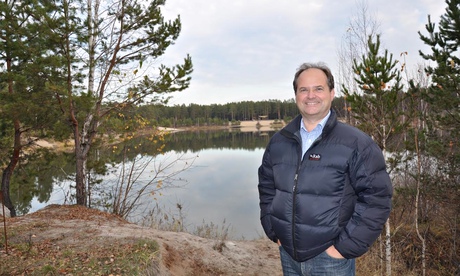Chris Elders is Chevron professor of petroleum geology at Curtin University. Prior to that he was a professor at Royal Holloway, University of London, UK. He moved to Australia in 2013
After 20 years at Royal Holloway, part of the University of London, a number of friends and colleagues commented that it was a "brave" decision to move half way across the world to Curtin University. I don't think there are many that would have to think twice about exchanging Egham for Perth, but while the differences are obvious, there are many similarities that have made the transition very straightforward.
After nine months in my new home, I don't feel as if I have been particularly brave, but I have found the change stimulating, exciting and invigorating. At the same time I have moved from a small college with a 125-year history and 8,500 students to a university with a student body of 38,000 that has rapidly developed in the 27 years since its transformation from the Western Australian Institute of Technology to become ranked 25th in the 50 universities under 50 years old. So not just a new country – a different style of institution as well.
There are of course new things to learn. Australia must be world champions in the use of acronyms, so there is a whole new language of abbreviations to learn and different terminologies that can at first seem strange (everyone on a grant is a principal investigator, not just the person leading the project, and a PDF is a postdoc, not an electronic document).
Having avoided the worse excesses if the GFC (Global Financial Crisis – you see what I mean?), my first impression of Australia was of a much more buoyant mood and well resourced system than in the UK. However a number of things have conspired to take the shine off that.
The mining boom is coming to an end, bringing a sharp whiff of reality to a high cost, strong currency economy. The change of government last September has also brought with it a sudden raft of policy changes, eerily reminiscent of those that have been introduced in the UK – although here in Australia they were introduced in a budget announcement that no-one had really anticipated.
It is striking that with this, and with other education policies affecting schools, that they have been introduced in such a hurry that their implementation hasn't really been thought through. Even government ministers aren't clear how they will work out, resulting in contradictory statements that are hastily "clarified" or withdrawn.
Not surprisingly, the natural feeling of optimism that pervades the Aussie spirit is giving way to a feeling of nervousness and uncertainty. It's inevitable that the liberalisation of fees, rising student debts, and cuts in research funding will all be implemented in one form or another.
But many positives remain. I am struck by the much greater sense of collaboration between institutions, compared with the more fiercely competitive atmosphere in the UK.
Although funding for research remains highly competitive, it feels as if there are more opportunities, and in my own field of petroleum geoscience, there are tremendous opportunities to develop applied research and training programmes, in a sense to catch up with the UK.
And while some aspects of university administration are more complex and labyrinthine, it is a pleasure to work in a system where quality assurance is applied with a much lighter touch. It is also a pleasure to work with students who show a higher degree of independence and initiative.
Superficially, the higher education sector in Australia can seem more like the education system that I joined 20 years ago in the UK – the changes that have been introduced in Britain during that period are happening, or are on the horizon in Australia. I hope that Australia can learn from the UK, and introduce some of those necessary changes in a more positive way, so that we can continue to enjoy the enterprise and resourcefulness that this special country brings.
 Emily Hudson: 'I have found that the UK's size makes it far easier to maintain connections with the broader academic community.' Photograph: Edmund Blok
Emily Hudson: 'I have found that the UK's size makes it far easier to maintain connections with the broader academic community.' Photograph: Edmund Blok
Emily Hudson is a law fellow at St Peter's College, University of Oxford. Prior to that she was a lecturer at the University of Queensland. She moved to the UK in 2012
Why did I decide to leave my job at the University of Queensland and move to the UK? The last few weeks notwithstanding, certainly not for the weather!
In many respects the decision to accept a job at Oxford was easy. Oxford is one of the world's leading universities, and with its tutorial system and college structure, it promised an experience different from anything in Australia. And of course there was the opportunity to live and work in another country.
Although my own teaching responsibilities have changed dramatically, for instance moving from coordinating a compulsory undergraduate subject with upwards of 300 students to delivering tutorials for the 20 law students at St Peter's College, I think there are broad similarities between teaching in the UK and Australia.
Experiences are institution- and course-specific, and can change from one group of students to the next. I have found that the Oxford environment encourages students to be more self-sufficient, and that the tutorial system provides unparalleled opportunities for feedback and mentoring. However, Oxford does not have a monopoly on excellence – I taught many brilliant students at the University of Queensland, and can vouch for the breadth and depth of my legal education at the University of Melbourne.
Research experiences likewise seem to be institution-specific, although there are some common themes across the sector. One example is the influence of external measures of research quality. Here the UK and Australian systems each have their pros and cons. For instance, the UK rules regarding contributions to the Research Excellence Framework (four publications from any given person put forward, unless they fall within an exception) can make planning easier, and compared with the Australian model, emphasise quality rather than quantity.
That said, I know some academics found the process of having their work assessed by their institution to be brutal. The Australian system requires a certain percentage of publications to be contributed across the entire faculty, which can create a greater sense of community – although the rules can be such that productive members of staff come under pressure to pump out publications.
In terms of the overall culture, I have found that the UK's size and proximity to other countries makes it far easier to maintain connections with the broader academic community. Australia also has an active community of scholars, but it is harder to generate the energy of the UK. That said, the Australian lifestyle has a lot to recommend it, particularly for those who like outdoorsy stuff. I can understand why the British excel at pub-based pursuits like darts and watching sport.
Finally, and although it may be crass to discuss this in polite company, the issue of salary has to be mentioned. To put it bluntly, academic salaries in Australia are much higher than the UK. In my field, staff in permanent positions can earn twice as much by working in Australia, especially those in mid-level and senior positions.
Of course, in some Australian cities a seemingly high salary is quickly eaten away by eye-watering costs of living; and early-career and non-permanent staff get some pretty shoddy treatment in both countries. However, I am concerned that the UK academy should not become a hobby farm for those who were born or married into wealth.
This blog post is part of our two-week series on the differences and similarities between Australian and UK higher education.
Join the higher education network for more comment, analysis and job opportunities, direct to your inbox. Follow us on Twitter @gdnhighered.












